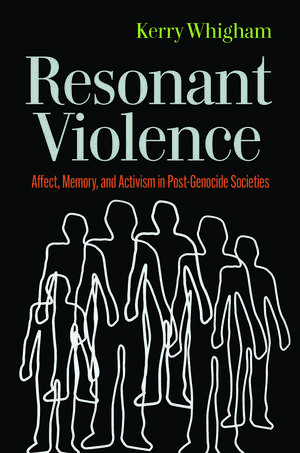Resonant Violence: Affect, Memory, and Activism in Post-Genocide Societies: Genocide, Political Violence, Human Rights
Autor Kerry Whighamen Limba Engleză Paperback – 11 feb 2022
Din seria Genocide, Political Violence, Human Rights
-
 Preț: 242.71 lei
Preț: 242.71 lei - 23%
 Preț: 524.59 lei
Preț: 524.59 lei -
 Preț: 283.61 lei
Preț: 283.61 lei -
 Preț: 279.10 lei
Preț: 279.10 lei -
 Preț: 325.34 lei
Preț: 325.34 lei -
 Preț: 231.34 lei
Preț: 231.34 lei -
 Preț: 326.60 lei
Preț: 326.60 lei -
 Preț: 314.87 lei
Preț: 314.87 lei -
 Preț: 330.27 lei
Preț: 330.27 lei -
 Preț: 304.82 lei
Preț: 304.82 lei -
 Preț: 316.25 lei
Preț: 316.25 lei -
 Preț: 282.66 lei
Preț: 282.66 lei -
 Preț: 313.73 lei
Preț: 313.73 lei -
 Preț: 521.03 lei
Preț: 521.03 lei -
 Preț: 315.86 lei
Preț: 315.86 lei - 28%
 Preț: 323.76 lei
Preț: 323.76 lei - 27%
 Preț: 186.15 lei
Preț: 186.15 lei -
 Preț: 340.40 lei
Preț: 340.40 lei - 27%
 Preț: 912.18 lei
Preț: 912.18 lei -
 Preț: 362.28 lei
Preț: 362.28 lei -
 Preț: 365.95 lei
Preț: 365.95 lei -
 Preț: 404.13 lei
Preț: 404.13 lei -
 Preț: 452.27 lei
Preț: 452.27 lei -
 Preț: 213.41 lei
Preț: 213.41 lei - 10%
 Preț: 914.00 lei
Preț: 914.00 lei -
 Preț: 361.12 lei
Preț: 361.12 lei - 10%
 Preț: 911.33 lei
Preț: 911.33 lei -
 Preț: 298.90 lei
Preț: 298.90 lei -
 Preț: 255.79 lei
Preț: 255.79 lei
Preț: 361.85 lei
Nou
Puncte Express: 543
Preț estimativ în valută:
69.24€ • 71.54$ • 57.60£
69.24€ • 71.54$ • 57.60£
Carte indisponibilă temporar
Doresc să fiu notificat când acest titlu va fi disponibil:
Se trimite...
Preluare comenzi: 021 569.72.76
Specificații
ISBN-13: 9781978825550
ISBN-10: 1978825552
Pagini: 268
Ilustrații: 17 b-w images
Dimensiuni: 156 x 235 x 20 mm
Greutate: 0 kg
Editura: Rutgers University Press
Colecția Rutgers University Press
Seria Genocide, Political Violence, Human Rights
ISBN-10: 1978825552
Pagini: 268
Ilustrații: 17 b-w images
Dimensiuni: 156 x 235 x 20 mm
Greutate: 0 kg
Editura: Rutgers University Press
Colecția Rutgers University Press
Seria Genocide, Political Violence, Human Rights
Notă biografică
KERRY WHIGHAM is an assistant professor of genocide and mass atrocity prevention at the Institute for Genocide and Mass Atrocity Prevention at Binghamton University in New York. He is also the director of research and online education at the Auschwitz Institute for the Prevention of Genocide and Mass Atrocities. For more information, visit www.kerrywhigham.com.
Cuprins
Introduction: “The Abuse Lives in our Blood”
1. Resonant Violence: The Felt Unfelt of Genocide and Its Aftermath
2. Building Memory: Practices of Memorialization in Post-Holocaust Berlin
3. Filling the Absence: Embodied Engagements with Former Sites of Atrocity
4. Embodied Justice: H.I.J.O.S., Practices of Trans-Action, and Biopoetics in Post-Dictatorship Argentina
5. Occupying Space, Amplifying Affect: The American Indian Occupation of Alcatraz Island
6. Conclusion: Out of the Desert
Acknowledgments
Notes
Bibliography
Index
1. Resonant Violence: The Felt Unfelt of Genocide and Its Aftermath
2. Building Memory: Practices of Memorialization in Post-Holocaust Berlin
3. Filling the Absence: Embodied Engagements with Former Sites of Atrocity
4. Embodied Justice: H.I.J.O.S., Practices of Trans-Action, and Biopoetics in Post-Dictatorship Argentina
5. Occupying Space, Amplifying Affect: The American Indian Occupation of Alcatraz Island
6. Conclusion: Out of the Desert
Acknowledgments
Notes
Bibliography
Index
Recenzii
"This theoretically sophisticated yet accessible book marks an important advance for research. It breaks from mainstream approaches and introduces a novel set of explorations around the idea of 'resonant violence,' going well beyond the concept of trauma as normally understood. It should be widely read."
"Kerry Whigham's great intelligence and sensibility are on display throughout this book. In addition to introducing the notion of 'resonant violence,' he not only integrates memory studies, affect theory, performance studies, and transitional justice eruditely to the study of the topic, but also shows the importance of embodied practices for addressing and preventing genocidal violence."
"This authoritative, informative and resourceful book contributes to new knowledge on forms of genocidal violence, oppression, discrimination and structural institutional power in context specific ways with a blend of astounding clarity, conciseness and sharp analysis. Kerry Whigham emphasizes that oppression of any kind is not the natural order of society and explains, using examples, how groups of people come together to understand how violence is constructed, perpetuated and structurally advanced. These people offer crucial lessons for consideration of a possible post-discriminatory world as not only possible, but necessary. This book is an essential resource for anyone in the field of genocide studies and the prevention of violent conflict."
Descriere
Resonant Violence explores both the enduring impacts of genocidal violence and the varied ways in which states and grassroots collectives respond to and transform this violence through memory practices and grassroots activism. By calling upon lessons from Germany, Poland, Argentina, and the Indigenous United States, Resonant Violence demonstrates how ordinary individuals come together to engage with a violent past to pave the way for a less violent future.
